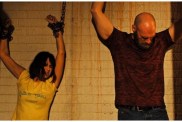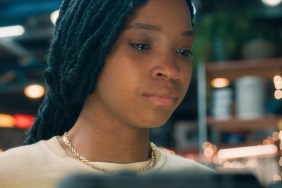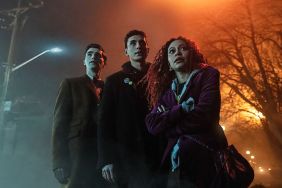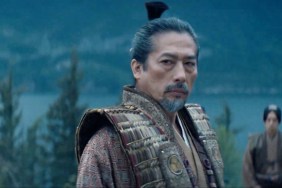The True Blood star on his bloody western

As unfair as it might be, it’s hard to think of Ryan Kwanten without immediately imagining Jason Stackhouse, his character on the incredibly popular HBO series True Blood. As much success as the role has brought him, Jason is, to put it mildly, not especially intelligent, and it’s easy for some people to think that he’s just an extension of the Australian actor’s own personality. But seeing Kwanten in the new film Red Hill, directed by fellow Aussie Patrick Hughes, it’s immediately apparent that the young actor is capable of considerably more than the sum of Jason Stackhouse’s IQ.
Shock Till You Drop sat down with Kwanten and Hughes at Fantastic Fest this year, where the film screened to capacity audiences and received positive reviews. In addition to talking about making the transition from True Blood to bloody showdowns, Kwanten revealed details about his process as a performer, and the two of them reflected on the themes and the tone of Red Hill, which feels like a decidedly darker and more violent version of a John Ford film, recontextualized in a remote Australian town.
ShockTillYouDrop: First of all, this movie has a really interesting intensity that makes it effective as a drama and as a thriller.
Ryan Kwanten: Patrick and I were saying from the get-go that if this was a $60 million film, we’d still be compromising. But it’s not a $60 million film, so inherently you have to kind of love the imperfections.
Patrick Hughes: You have to embrace them. We said that from the beginning â we shot the whole thing in four weeks on second-hand film stock, so it’s kind of like XXY filmmaking, with an amazing crew.
Shock: You say you had to make certain compromises, but were there things going in you knew you were not going to be able to do?
Hughes: You know, the biggest compromise in filmmaking is just time. Money buys you time, so on a normal film, you might shoot a minute a day, a minute and a half, but we’d shoot five a day. The âwar room’ scene, we shot that before lunch, and there’s a sh*tload of dialogue and there’s all of these guys, so it was pretty stressful. And also Ryan, thank God with his incredible talent he would just deliver the first time every time, and it would enable us to say, right, we got it, let’s move on to the next set-up. There are certainly a million things I could go through about what I would love to change, but you need to at a certain point just embrace it. I got inspired by all of those filmmakers who just went out and made their first films with private money and no distributors, and I think if you can just tell the story, if that translates, then you can go above and beyond.

Kwanten: And that’s really what it was. We felt like we were sort of like these renegades, these rogues, who were out in this one-horse town, doing what they used to do back in the â70s, the glory days of filmmaking. We were all just putting our heads together for one common goal of making a good film, and the harder it got, the more into it we were.
Shock: Does Australia have a strong tradition of making Westerns? According to âNot Quite Hollywood,’ there was obviously one of exploitation films in general. But although there are a few Sergio Leone-esque moments, âRed Hill’ feels more like a John Ford-style Western.
Hughes: I’ll take that one (laughs). Well, our wild west and the early days of colonialism or establishing these towns has similarities to the formation of America. There’s huge similarities, and these towns did operate this way â they were lawless sort of towns. I guess I was just looking at that landscape saying, why has no one told a modern-day Western? Because what makes a Western sort of tick is that sense of isolation, that you’re stuck in this landscape and no one can pick up a phone; where we were shooting, the nearest town was like a good hour and a half drive, and you really are isolated. But it was more just that landscape, and that hadn’t been seen either â like the clichéd imagery of what an Australian film is always involves the Outback, but we actually do have these extraordinary landscapes and mountains and small towns. And I think there’s something just very creepy about these small towns.
Kwanten: Yeah, the mountains definitely gave it a sense of foreboding, and also it just increased their isolation. Obviously the grand scope of the thing was always going to be there, but for me, what I saw when I watched the film was that it just seemed like a whole other world on the other side of those mountains. For any help to get in, it seemed like it was going to take a while.
Shock: Other than his need to get his wife out of the city, is the reason he went to this specific town because he was assigned there, or did he pick it himself?
Hughes: Certainly where Shane is coming from in that pain and that hurt that they’re carrying from having lost their last pregnancy, he moved there for sake of his family and his wife. But we always talked about the fact that he would have requested a transfer out of the city, and we talked about him coming up, because once [sheriffs] reach 60, they have to hand over their badge, like time’s up. So it was kind of interesting looking at Officer Manning, who is certainly a younger version of Bill that he’s grooming, and Barlow, who’s sort of that innocent cop that is too weak to say anything â and then there’s Shane Cooper.
Shock: Suffice it to say you have a lot of visibility thanks to âTrue Blood,’ but no offense, your character is maybe not the sharpest tool in the shed. Did you give any thought when taking on this role to the fact that he was significantly different than Jason Stackhouse?
Kwanten: I love playing him for six months of the year, but to jump into those extra-tight jeans after that six months just seems ridiculous. That’s not how I tick; I’m looking for challenges, I’m looking to work with good filmmakers, and I’m looking to make great stories. This ticked all of those boxes, and I was pleasantly surprised that it was an Australian film, too. But the actual thing that struck me the most was that I read a lot, and this was a script that sort of had no unnecessary exposition, which is really weird to get in sort of a first-time filmmaker. There was just no fat on the meat, it was all what was necessary, and I’m sure it was evident even in what was left on the cutting room floor that there’s not really that much when you compare it to anything else. So that was a real impressive thing, and yeah, it was a chance to be the hero, but not your typical kind of hero, and in a western. That’s every guy’s dream.

Shock: The fact that there was a lack of that exposition that could be overbearing…
Kwanten: It gave credit to the audience. You’re not spoon-feeding them everything; they actually get the chance to think for themselves which I think is such a rarity in this day and age – to walk out of it and to be thinking about it the next day, the next week, when you’re so used to just finishing your popcorn and walking out, going what was that?
Shock: Does that lack of exposition give you more work to do as an actor to develop the character? Or was all of the character detail you needed in the script even without it?
Kwanten: I don’t know. I’d like to think that we were sort of incredibly honest with each other in terms of how we viewed the character, but we also gave each other an tremendous amount of leeway. Like if Patrick said it was this way, either I would agree or I wouldn’t, but there was always an open communication channel. But we always said that he was the moral compass of the filmâ¦
Hughes: Yeah. For me to sit down and write it, I wanted to create this monster of Jimmy, and we know nothing about him but you certainly find out that thematically, there’s some deeper issues going on, and Old Bill, his character hangs onto the past in this town that’s dying. His father was the lawman, and his father before him, and then in walks Shane. And I liked the transformation â how does a city cop become a cowboy, and how does he cross that line, and if he’s going to have blood on his hands, what’s the cost? At what point is Shane going to cross that line, and actually use his weapon? And it comes down to that moral code, which is what all Westerns are tied to.
Shock: As opposed to maybe your work on âTrue Blood’ where you have the chance to explore the character over the course of a season, is it important to have a clear definition of what a character goes through in a film at the time you start shooting? Or is the process of discovery in each scene as you shoot it more important?
Kwanten: It’s definitely a case of both. I don’t get anywhere near that set unless I’m comfortable with it, but then I would be an ignorant actor to ignore things that happen on the day. I mean, with the way we were shooting, you have delusions of grandeur anyway â as an actor I have a huge imagination â but I have to channel that for the sake of the scene, for the sake of the sanity of the set. You cut lines, you change lines, you make up things or perhaps people say âhow about we try it this way,’ and you have to be malleable enough, but it’s in that malleability that you find sometimes these rare moments of, f*ck, I never thought that would work â that’s really cool! Let’s go with that.

I think there were certainly days and nights, especially when Steve [Bisley] and Ryan were on set, there wasn’t too much joking around, especially when we were doing that bar scene, because it was so full-on and intense. And it was the kind of set where there wasn’t a shot where someone’s head didn’t get blown off, and it does sort of subconsciously seep into you. Like Ryan was always walking around with a busted face-
Kwanten: Happily!
Hughes: People were walking around soaked in blood, and you’re shooting and it’s getting pretty nasty and there’s all of this serious stuff. I mean, Ryan’s amazing on set and all of the actors were great, but it certainly felt like â well, this was my perception, anyways â that it wasn’t like we called cut and [Ryan] would be mucking around with Steve in between takes. You do kind of have to keep your distance, like when we were shooting the scene in the pub with Ryan and Steve, and to be authentic in that scene, I think it would be incredibly hard as an actor to be joking about something minutes before and then to do it. I think you want to keep your distance a little.
Kwanten: Yeah, and it’s funny because we actually get quite a few laughs into the film, particularly in sort of the first third, I guess. I think in a bizarre way that they elevate the visceral response that you get in the end, because it humanizes everything â it humanizes Shane, it humanizes Old Bill, and then with the whole film, if you can get an audience member going through a whole gamut of emotions, they’re going to be riding with you to the bitter end.
Shock: How do you compare doing a role like this, where the stakes and the details are very realistic, to one like on True Blood, where the universe is more exaggerated and fantastical?
Kwanten: Well, it’s the nature of the beast â it’s what we do. I’ve worked so hard to put myself in that position to be able to play an enormous amount of characters, and I love the fact that I have been bestowed these f*cking amazing roles. I mean, I did three films last year, all very, very different, and all rewarding experiences in their own right. Some people do want to play the same roles; that’s their thing, that’s what they do, and they don’t want to break outside of their comfort zone. And more power to them, but that’s not my thing.




Source: Todd Gilchrist









